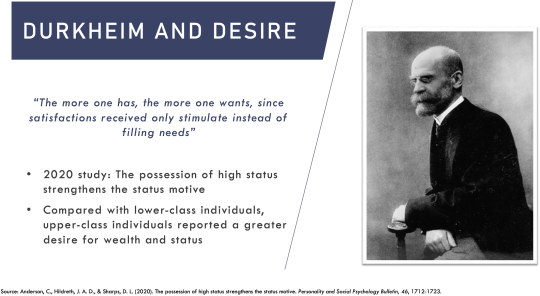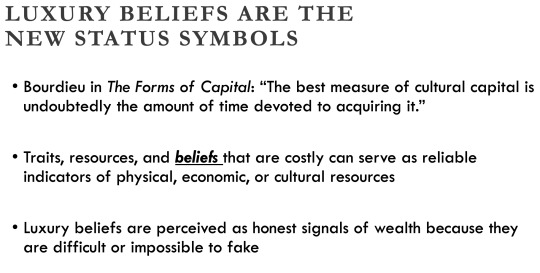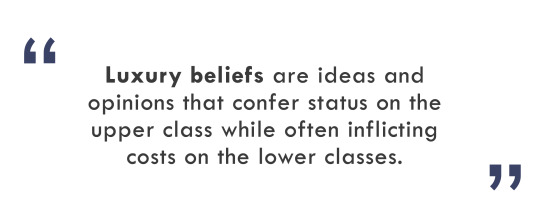#Zahavi
Text
“These findings were later echoed by the renowned French sociologist Pierre Bourdieu in his 1979 book Distinction: A Social Critique of the Judgment of Taste.
In his body of work, Bourdieu described how “distance from necessity” characterized the affluent classes. In fact, Bourdieu coined the term “cultural capital.”
Once our basic physical and material needs are met, people can then spend more time cultivating what Bourdieu called the “dispositions of mind and body” in the form of intricate and expensive tastes and habits that the upper classes use to obtain distinction.
Corresponding with these sociological observations, the biologist Amotz Zahavi proposed that animals evolve certain displays, traits, and behaviors because they are so physically costly.
(…)
So for humans, top hats and designer handbags are costly signals of economic capacities; for gazelles, stotting is a costly signal of physical capacities.
Veblen, Bourdieu and Zahavi all claimed that humans—or animals—flaunt certain symbols, communicate in specific ways, and adopt costly means of expressing themselves, in order to obtain distinction from the masses.
Animals do this physically.
And affluent humans often do it economically and culturally, with their status symbols.
A difference, though, is that human signals often trickle to the rest of society, which weakens the power of the signal. Once a signal is adopted by the masses, the affluent abandon it.
(…)
The yearning for distinction is the key motive here.
And in order to convert economic capital into cultural capital, it must be publicly visible.
But distinction encompasses not only clothing or food or rituals. It also extends to ideas and beliefs and causes.
In his book WASPS: The Splendors and Miseries of an American Aristocracy, the author Michael Knox Beran examined the lives and habits of upper-class Americans from the mid-nineteenth to the mid-twentieth century.
He writes that “WASPS” had mixed feelings about their fellow citizens.
These upper-crust Americans viewed ordinary Americans as “sunk in moronic darkness” and that “It is a question whether a high WASP ever supported a fashionable cause without some secret knowledge that the cause was abhorred by the vulgarians.”
This still goes on today.
In the past, people displayed their membership in the upper class with their material accoutrements.
But today, because material goods have become a noisier signal of one’s social position and economic resources, the affluent have decoupled social status from goods, and re-attached it to beliefs.
The upper class craves distinction.
(…)
A 2020 study titled “The possession of high status strengthens the status motive” led by Cameron Anderson at UC Berkeley found that relative to lower-class individuals, upper-class individuals have a greater desire for wealth and status.
In other words, high-status people desire wealth and status more than anyone else.
(…)
Expressing a luxury belief is a manifestation of cultural capital, a signal of one’s fortunate economic circumstances.
There are other examples of luxury beliefs as well, such as the downplaying of individual agency in shaping life outcomes.
A 2019 study led by Joseph Daniels at Marquette University was published in the journal of Applied Economics Letters.
They found that individuals with higher income or a higher social status were the most likely to say that success results from luck and connections rather than hard work, while low-income individuals were more likely to say success comes from hard work and individual effort.
Well, which belief is more likely to be true?
Plenty of research indicates that compared with an external locus of control, an internal locus of control is associated with better academic, economic, health, and relationship outcomes. Believing you are responsible for your life’s direction rather than external forces appears to be beneficial.
Here’s the late Stanford psychology professor Albert Bandura. His vast body of research showed that belief in personal agency, or what he described as “self-efficacy,” has powerful positive effects on life outcomes.
Undermining self-efficacy will have little effect on the rich and educated, but will have pronounced effects for the less fortunate.
It’s also generally instructive to see what affluent people tell their kids. And what seems to happen is that affluent people often broadcast how they owe their success to luck. But then they tell their own children about the importance of hard work and individual effort.
(…)
When I was growing up in foster homes, or making minimum wage as a dishwasher, or serving in the military, I never heard words like “cultural appropriation” or “gendered” or “heteronormative.”
Working class people could not tell you what these terms mean. But if you visit an elite university, you’ll find plenty of affluent people who will eagerly explain them to you.
When people express unusual beliefs that are at odds with conventional opinion, like defunding the police or downplaying hard work, or using peculiar vocabulary, often what they are really saying is, “I was educated at a top university” or “I have the means and time to acquire these esoteric ideas.”
Only the affluent can learn these things because ordinary people have real problems to worry about.
To this extent, Pierre Bourdieu in The Forms of Capital wrote, “The best measure of cultural capital is undoubtedly the amount of time devoted to acquiring it.”
The chief purpose of luxury beliefs is to indicate evidence of the believer’s social class and education.
Members of the luxury belief class promote these ideas because it advances their social standing and because they know that the adoption of these policies or beliefs will cost them less than others.
(…)
Why are affluent people more susceptible to luxury beliefs? They can afford it. And they care the most about status.
In short, luxury beliefs are the new status symbols.
They are honest indicators of one’s social position, one’s level of wealth, where one was educated, and how much leisure time they have to adopt these fashionable beliefs.
And just as many luxury goods often start with the rich but eventually become available to everyone, so it is with luxury beliefs.
But unlike luxury goods, luxury beliefs can have long term detrimental effects for the poor and working class. However costly these beliefs are for the rich, they often inflict even greater costs on everyone else.”
#henderson#rob henderson#luxury beliefs#luxury#psychology#bourdieu#pierre bourdieu#veblen#thorstein veblen#zahavi#amotz zahavi#beran#michael knox beran#class#status#status symbols#peacock
2 notes
·
View notes
Text
TS vixen Natalie Mars spanked before bareback sex
My Own Video for XVIDEOS Verification
Very small and young gay sex xxx An Extreme Wank Experience
Latino Gay Got His Ass A Big Hard Dick
black nurse cheating anal
Jean Rdz Hotwife y Esposo recienbo leche
Asian Thai Girl Sucks Cock For Cash
Emo gay wanks off while anally penetrated by skinny lover
Four sexy black bitches with round asses fuck one white stud on couch
Actors gay porn and hard young thugs Twink Boy Fingered And Fucked
#Trans-martian#dataria#traitorlike#boons#Shamokin#wraist#openhanded#compitum#sublimates#ölüm#DOP#haet#Clintonia#acronymic#unentitlement#arthur#Zahavi#ameliorativ#klaberjass#startingno
1 note
·
View note
Text


Coming from a long line of successful merchants and beloved dearly by his family, Zahavi here has yet to fully understand the circumstances of his unique recovery.
#Zahavi Al-Salim#macksarts#sketches#i love when fledgling vampires go through the motions totally unaware of what's changing within them#he's going to miss garlic bread if we don't do something about it soon#DND#DND OCS#DND SKETCHES
10 notes
·
View notes
Note
Mirella shook her head trying to gather her things when Zahavi gripped her wrist. She shook her head again her eyes tearing up.
“I should be tending to my duties - taking care of Rhys and Mars. I - you’re distracting me. Someone always dies when I am distracted."
She was going to run herself into the ground, he could see how hard she was working and the weight that was resting upon her shoulders. He respected her, he had never said anything before now, but he wanted her to take a moment for himself.
His eyes filled with concern when she spoke, stepping closer as he placed his hand on the side of her side, his thumb caressing her cheek.
“When I distract you is the only time you take a moment for yourself, your siblings will be fine for a few more moments Mireya.”
2 notes
·
View notes
Text
.
#I love Lewy but he and Zahavi are being annoying at this point#yes I also blame the board#2 things that can coexist
2 notes
·
View notes
Text
pini zahavi: stfu challenge
lewy: thanks for everything. come follow me, i will show you out the door
#i'm so over this shit#sorry if this is controversial#and i'm not saying our board is innocent#but zahavi is making me want to punch a wall
5 notes
·
View notes
Text
To consider that an important part of my happiness depends of a man who has several different birthdates (yes I’m talking about you Pini) is the ultimate proof that something went wrong at a certain point of my life.
2 notes
·
View notes
Text
Israeli Pilots Who Bombed Hospitals In Gaza Identified

Reports on the Israeli pilots involved in the airstrikes that targeted hospitals and civilians in Gaza have been published by Nournews.
Tal Zahavi, pictured on the left, boasting over 23 years in the Israeli Air Force, has been involved in air operations against civilians in Gaza for the past 73 days, including the bombing of Deir al-Balah’s residential areas on October 19 and November 7, and the bombing of Rafah on October 26 and December 12, leading to the tragic killing of at least 675 Palestinians, including 230 children.
Guy Isaac Alon, pictured on the right, has also been actively involved in the last 73 days, participating in the bombing of two hospitals, namely Gaza’s Baptist Hospital and Al-Shifa Hospital. He also played a role in the bombing of six mosques, Al Amal Hospital in Khan Yunis, as well as other densely populated civilian areas, resulting in the tragic killing of at least 500 Palestinians, including 165 children.
Via: Mint Press News
#free gaza#gaza#gaza strip#gazaunderattack#gaza genocide#ceasefire#palestinians#genocide#free palestine#palestine#current events#human rights#gaza war#abolish israel#israel politics#hamas#benjamin netanyahu#i stand with palestine#middle east#resistance#israel palestine conflict#israel#al qassam brigades#islamic resistance#muslim ummah#ummah#one ummah#islam#muslim#muslims
2K notes
·
View notes
Text
Israeli Radio Host Suspended For Saying Frum Jews “Should Hang Themselves With Their Tefillin”
Israeli Radio Host Suspended For Saying Frum Jews “Should Hang Themselves With Their Tefillin”
An Israeli radio host was suspended after he said that he’d be happy if frum Jews would “hang themselves with their tefillin.”
Natan Zahavi, who is known for his extremist statements and his vitriol against Yiddishkeit, said during his program on Radio 103FM: “All these lowlifes quote me pessukim from the Tanach: Daven, put on tefillin, light Shabbos candles, separate challah, wear modest…

View On WordPress
1 note
·
View note
Text
Israeli protester says the Israeli government is acting like Nazi German...
#palestine#free palestine#gaza#free gaza#gaza strip#israel#genocide#current events#israel is a terrorist state#important
32 notes
·
View notes
Text
By: Rob Henderson
Published: Jun 12, 2022
Let’s start with a question: What do top hats and “defund the police” have in common?

Before we explore it, I’ll very briefly tell you about my unusual background.
Currently, I’m a doctoral candidate in psychology at Cambridge and a faculty fellow at the University of Austin. And before this, I studied psychology at Yale as an undergraduate.
But before entering these universities, my life was a lot different.
I was born into poverty and grew up in foster homes in Los Angeles and all around California. I fled as soon as I could at age 17, enlisting in the military right after high school.

I then attended Yale on the GI Bill. That was a very different environment for me.
At Yale, there are more students from families in the top 1 percent of the income scale than from the entire bottom 60 percent.

Throughout my experiences traveling along the class ladder, I made a discovery:
Luxury beliefs have, to a large extent, replaced luxury goods.
Luxury beliefs are ideas and opinions that confer status on the upper class, while often inflicting costs on the lower classes.
In 1899, the economist and sociologist Thorstein Veblen published a book called The Theory of the Leisure Class.
Drawing on observations about social class in the late nineteenth century, Veblen’s key idea is that because we can’t be certain about the financial status of other people, a good way to size up their means is to see whether they can afford expensive goods and leisurely activities.
This explains why status symbols are so difficult to obtain and costly to purchase.
In Veblen’s day, people exhibited their status with delicate and restrictive clothing like tuxedos, top hats, and evening gowns, or by partaking in time-consuming activities like golf or beagling.
These goods and leisurely activities could only be purchased or performed by people who did not work as manual laborers and could spend their time and money learning something with no practical utility.
Veblen even goes so far as to say, “The chief use of servants is the evidence they afford of the master’s ability to pay.” For Veblen, butlers are status symbols, too.

In short, his idea was about how economic capital was often converted into cultural capital.
These findings were later echoed by the renowned French sociologist Pierre Bourdieu in his 1979 book Distinction: A Social Critique of the Judgment of Taste.
In his body of work, Bourdieu described how “distance from necessity” characterized the affluent classes. In fact, Bourdieu coined the term “cultural capital.”
Once our basic physical and material needs are met, people can then spend more time cultivating what Bourdieu called the “dispositions of mind and body” in the form of intricate and expensive tastes and habits that the upper classes use to obtain distinction.

Corresponding with these sociological observations, the biologist Amotz Zahavi proposed that animals evolve certain displays, traits, and behaviors because they are so physically costly.
Many people are familiar with the example of the peacock’s tail. Only a healthy bird is capable of growing such plumage while managing to evade predators.
A lesser known example is the behavior of the African gazelle.
When these animals spot a predator, the healthy adult gazelles often engage in what is called “stotting.” They repeatedly jump as high as they can, springing vertically into the air with all four feet raised.

The signal this sends to predators is essentially: “I’m so fit that I can afford to expend valuable energy to show you how strong and robust I am compared with the other gazelles.” The predators then direct their attention to less lively and energetic targets.
So for humans, top hats and designer handbags are costly signals of economic capacities; for gazelles, stotting is a costly signal of physical capacities.
Veblen, Bourdieu and Zahavi all claimed that humans—or animals—flaunt certain symbols, communicate in specific ways, and adopt costly means of expressing themselves, in order to obtain distinction from the masses.
Animals do this physically.
And affluent humans often do it economically and culturally, with their status symbols.
A difference, though, is that human signals often trickle to the rest of society, which weakens the power of the signal. Once a signal is adopted by the masses, the affluent abandon it.
There are historical examples of this.
For example, in the middle ages, spices were expensive and only the elites could afford them. It was a hard-to-fake signal of one’s social rank and economic resources.
But as Europeans colonized India and the Americas, the cost of spices dropped, and the masses were now able to obtain them.
As a result of widespread use, spices were no longer a status symbol.

Elites decided they were vulgar, and during the reign of France’s Louis XIV, court chefs banned sugar and spice from all meals except for desserts.
Here’s another example.
In the U.S., dueling was practiced primarily by the elite for many years.
One key reason why it fell out of fashion in the early nineteenth century is because this ritual of dueling was gradually adopted by the lower classes.
In response, the upper classes abandoned it because it was no longer prestigious. And then it was outlawed in the late nineteenth century.

The yearning for distinction is the key motive here.
And in order to convert economic capital into cultural capital, it must be publicly visible.
But distinction encompasses not only clothing or food or rituals. It also extends to ideas and beliefs and causes.
In his book WASPS: The Splendors and Miseries of an American Aristocracy, the author Michael Knox Beran examined the lives and habits of upper-class Americans from the mid-nineteenth to the mid-twentieth century.
He writes that “WASPS” had mixed feelings about their fellow citizens.

These upper-crust Americans viewed ordinary Americans as “sunk in moronic darkness” and that “It is a question whether a high WASP ever supported a fashionable cause without some secret knowledge that the cause was abhorred by the vulgarians.”
This still goes on today.
In the past, people displayed their membership in the upper class with their material accoutrements.
But today, because material goods have become a noisier signal of one’s social position and economic resources, the affluent have decoupled social status from goods, and re-attached it to beliefs.
The upper class craves distinction.
The French sociologist Émile Durkheim understood this when he wrote, “The more one has, the more one wants, since satisfactions received only stimulate instead of filling needs.”

And this is backed by recent research.
A 2020 study titled “The possession of high status strengthens the status motive” led by Cameron Anderson at UC Berkeley found that relative to lower-class individuals, upper-class individuals have a greater desire for wealth and status.
In other words, high-status people desire wealth and status more than anyone else.
By now you probably know the answer to the question I asked at the beginning: what do top hats have in common with defunding the police.
Well, who was the most likely to support the fashionable defund the police cause in 2020 and 2021?
A survey from YouGov found that Americans in the highest income category were by far the most supportive of defunding the police.

They can afford to hold this position, because they already live in safe, often gated communities. And they can afford to hire private security.
In the same way that a vulnerable gazelle can’t afford to engage in stotting because it would put them in increased danger, a vulnerable poor person in a crime-ridden neighborhood can’t afford to support defunding the police.
According to the U.S. Census Bureau, compared to Americans who earn more than $75,000 a year, the poorest Americans are seven times more likely to be victims of robbery, seven times more likely to be victims of aggravated assault, and twenty times more likely to be victims of sexual assault.
Expressing a luxury belief is a manifestation of cultural capital, a signal of one’s fortunate economic circumstances.
There are other examples of luxury beliefs as well, such as the downplaying of individual agency in shaping life outcomes.
A 2019 study led by Joseph Daniels at Marquette University was published in the journal of Applied Economics Letters.

They found that individuals with higher income or a higher social status were the most likely to say that success results from luck and connections rather than hard work, while low-income individuals were more likely to say success comes from hard work and individual effort.
Well, which belief is more likely to be true?
Plenty of research indicates that compared with an external locus of control, an internal locus of control is associated with better academic, economic, health, and relationship outcomes. Believing you are responsible for your life’s direction rather than external forces appears to be beneficial.
Here’s the late Stanford psychology professor Albert Bandura. His vast body of research showed that belief in personal agency, or what he described as “self-efficacy,” has powerful positive effects on life outcomes.

Undermining self-efficacy will have little effect on the rich and educated, but will have pronounced effects for the less fortunate.
It’s also generally instructive to see what affluent people tell their kids. And what seems to happen is that affluent people often broadcast how they owe their success to luck. But then they tell their own children about the importance of hard work and individual effort.
Now let’s discuss strange vocabulary.
When I was growing up in foster homes, or making minimum wage as a dishwasher, or serving in the military, I never heard words like “cultural appropriation” or “gendered” or “heteronormative.”

Working class people could not tell you what these terms mean. But if you visit an elite university, you’ll find plenty of affluent people who will eagerly explain them to you.
When people express unusual beliefs that are at odds with conventional opinion, like defunding the police or downplaying hard work, or using peculiar vocabulary, often what they are really saying is, “I was educated at a top university” or “I have the means and time to acquire these esoteric ideas.”
Only the affluent can learn these things because ordinary people have real problems to worry about.
To this extent, Pierre Bourdieu in The Forms of Capital wrote, “The best measure of cultural capital is undoubtedly the amount of time devoted to acquiring it.”

The chief purpose of luxury beliefs is to indicate evidence of the believer’s social class and education.
Members of the luxury belief class promote these ideas because it advances their social standing and because they know that the adoption of these policies or beliefs will cost them less than others.
Advocating for defunding the police or promoting the belief we are not responsible for our actions are good ways of advertising membership of the elite.
Why are affluent people more susceptible to luxury beliefs? They can afford it. And they care the most about status.

In short, luxury beliefs are the new status symbols.
They are honest indicators of one’s social position, one’s level of wealth, where one was educated, and how much leisure time they have to adopt these fashionable beliefs.
And just as many luxury goods often start with the rich but eventually become available to everyone, so it is with luxury beliefs.
But unlike luxury goods, luxury beliefs can have long term detrimental effects for the poor and working class. However costly these beliefs are for the rich, they often inflict even greater costs on everyone else.
#Rob Henderson#luxury beliefs#defund the police#status symbol#status seeking#virtue signal#virtue signalling#virtue signaling#psychology#human psychology#luxury goods#cultural capital#woke#wokeism#cult of woke#wokeness#wokeness as religion#religion is a mental illness
27 notes
·
View notes
Text

Meet Zahavi! My newest DnD OC. He's just been turned into a vampire and I forsee him having an awful time about it in the future.
#Zahavi Al-Salim#macksarts#still writing his story and its driving me mad but he finally has a name!#DND#DND OCS#DND SKETCHES
11 notes
·
View notes
Text

Thank you USA!
US firefighters arrive in Israel and immediately deploy to fire stations in the south.
The first group of American firefighters arrived in the early hours of Saturday. After clearing customs and immigration, they were met at the airport by the CEO of the Jewish Federation of Greater Philadelphia, EVP CEO, Adi Zahavi and EVP’s Head of Volunteers, Gill Haller. They were then given a comprehensive briefing on the situation in Israel as well as a vital security update and information on the fire stations they will be deploying to by the EVP’s Operations Manager Tomer Stein.
After enjoying a hearty, early morning breakfast, Local Firefighters from the Israeli Fire & Rescue Services took them to their deployment stations where they will work with Israeli fire teams answering the hundreds of calls generated by the current situation.
One of the Israeli firefighters who greeted the team said that they were overwhelmed by the number of call outs they had to respond to. “Many are from people who panic when they hear the Code Red alert and react to any unusual noise like a car backfiring as if a missile has landed close by. Obviously, we have to take every call seriously and the addition of our American brothers will make our lives easier and help us reach out to all those who need us”.
Adi Zahavi: “Once again our American friends have shown their support for Israel and their determination to do everything they can to help their brother firefighters. I am honored and humbled to be part of this project, that brings help to Israel whenever needed and build strong bonds of friendship between American and Israeli Firefighters".
Check out www.evp.org.il
29 notes
·
View notes
Text
To claim that there, in addition, exists a behind-the-scenes world, a hidden world that transcends every type of givenness, every type of evidence, and that this is the really real reality, is rejected as an empty speculative claim by the phenomenologists. In fact, they would insist that the very proposal involves a category-mistake, a misapplication and abuse of the very concept of reality. Rather than defining objective reality in terms of an inaccessible and ungraspable beyond, phenomenologists would argue that the right place to locate objectivity is in, rather than beyond, the appearing world.
-- Dan Zahavi, Phenomenology: The Basics (2018)
Mark Thorsby: Introduction to Phenomenology (January 2016)
youtube
Kimberly Engels: Phenomenology of UAP (Society for UAP Studies, October 2023)
youtube
Diana Walsh Pasulka, James Madden: Encounters & Hyperobjects (Kelly Chase, The UFO Rabbit Hole Podcast, November 2023)
youtube
Friday, December 1, 2023
11 notes
·
View notes
Text
On "shiny" Pokemon
One question I have often been asked is "what is the purpose of the shiny gene?"
Professor Coconut wishes to emphasize that first of all, it is not one single gene, it is a common mutation in a series which activates several other sequences. And second of all, it does not have a 'purpose'. It is simply a chance mutation that sometimes happens.
As to why it has not yet been entirely stamped out, there are several reasons:
First, many Pokemon expressing the 'shiny' mutation simply do not look that different. Many would be difficult to tell to the untrained eye. Those Pokemon can pass down their mutations with minimal issue.
As for ones that have a more overt 'shiny' color, we must first talk about handicapping.
The Handicap Principle, also known as Zahavi Handicapping after the principles' proposer, is when a wild animal or Pokemon has costly signals that show itself to be a very fit or reliable mate. For example, a male Unfezant has a large crest and much brighter coloration- These make it more conspicuous to predators, and have a greater calorie cost in maintaining that crest. However, in doing so, it demonstrates to potential mates that it is of high enough quality that it can spare the resources and is able to survive regardless.
The primary theory on why the 'shiny' sequence is passed down is that it is similar to handicapping- a 'shiny' Pokemon is much more conspicuous, and thus, if it survives to adulthood, it will have many more chances to breed by signaling itself as a quality mate. (For a time, it was believed that only male Pokemon could be shiny, and that was where this theory came from, but now it is thought to be a combination of Zahavi Handicapping and sexually antagonistic characteristics. A male 'shiny' Pokemon is more likely to die young due to being easy for predators to spot, but should it survive, it will mate much more.
... Or so the current theory is.
12 notes
·
View notes
Text
Why is Pini Zahavi holding a grudge against Bayern ?
First I thought that obviously it was because of Uli Höness’ comment (the he is a “greedy piranha” thing). Surely, it didn’t help but for me it’s not the real start of the problem. The more I think about it and the more I’m convinced that there is something else, something older than the discussions around David’s contract extension. So here’s my theory :
Pini was a sport journalist who quickly became a sport agent. In less than 20 years (he made his first deal in 1978) he turns out to be one of the most successful agent of the 2000′s years but it’s the part he took in making Roman Abramovitch buying Chelsea that promoted him to the rank of the most influential agent in the world and since then this title has always been his. During all these years Pini has done his business with a perfect discretion, no one knew his name apart from some journalists and some persons very well-versed in football, to the point that one of his nick-name is the “invisible hand”. But 2017, Pini is at the heart of the most consequent transfer of this sport history : Neymar’s signing with PSG, and suddenly his name is on everyone’s lips. It’s in this new light that Lewy appointed him as his agent a few months later and in this new light that he failed to make him leave Bayern at the end of the season. It’s probably not Pini’s biggest failure but it is the only public one and for me this is the first cause of Pini’s ire against us.
#I can't believe that I'm making theories about Pini Zahavi#this is bad#really#something wen't wrong with my life#i'm ashamed of myself#fc bayern#robert lewandowski#sorry for my english
0 notes